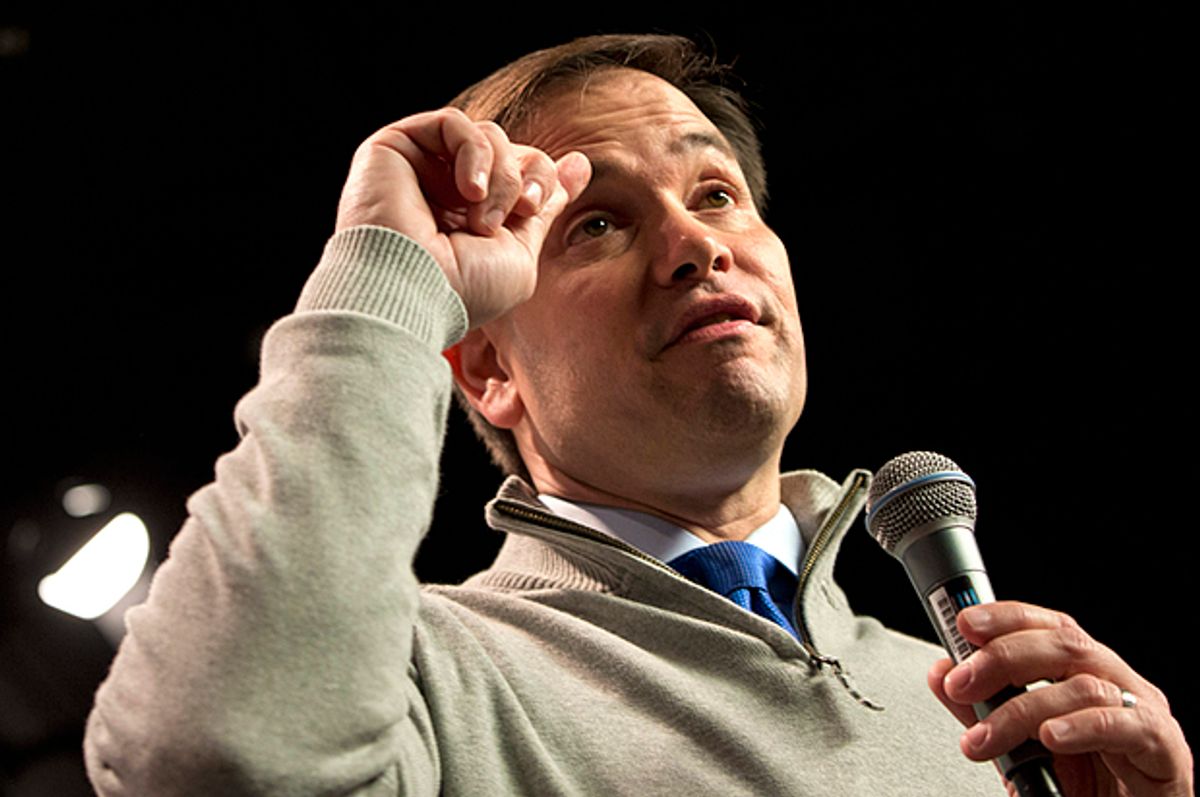After taking the fourth runner-up position in New Hampshire, Marco Rubio has embarked upon a political rehabilitation aimed at saving his presidential campaign. The first step he took toward winning voters back to his candidacy was admitting that he had a problem. “Our disappointment tonight is not on you,” Rubio told supporters after he lost New Hampshire. “It's on me. It's on me. I did not do well on Saturday night, so listen to this: That will never happen again. That will never happen again.”
He was referring, of course, to the last Republican debate, which saw the since-departed Chris Christie make a fool of Rubio by goading him into repeating the same nonsense talking point over and over. Rubio and his campaign spent the days between the debate and the primary angrily insisting that they were actually happy with how the interaction played out. “I would pay them to keep running that clip,” Rubio said on ABC News. “It's what I believe and what I'm going to continue to say.” It was all a front – they knew exactly how bad it had been, but they maintained a façade of confidence while quietly grousing about the growing cascade of negative media coverage. Once the New Hampshire returns came in, they finally admitted what everyone else already knew.
But, as the Washington Post’s Callum Borchers notes, the Rubio strategy now is to present that one bad debate as the only problem facing his candidacy, thus giving the impression that he can easily and quickly turn things around. And he’s achieving some degree of success: “If the media sends the message that Rubio's problem was a simple, one-off flub, it's easier for him to send the message that the solution will be simple, too.” The candidate himself is working hard to promote this idea. “I think it’s important to remember we’ve now had eight debates,” Rubio said on CNN, “and but for that one moment that created this distraction, I’ve performed very well in each of these debates.”
It’s not that simple, though. As the Washington Post and ABC News point out, the data don’t really point to the debate as being the lone culprit for Rubio’s poor finish. And when you start picking through the New Hampshire exit polls, a bunch of other warning sirens start blaring.
Rubio’s chief selling point as a candidate is supposed to be his electability. “If you make me the nominee, we’re gonna win. I will beat Hillary Clinton,” he told voters in Iowa leading up to the caucus. He’s been making that pitch for a while now, simultaneously boosting himself while implicitly disparaging the general election chances of candidates like Donald Trump and Ted Cruz. As one might expect, Rubio did pretty well with New Hampshire voters who were most interested in a candidate who can win in November, capturing 29 percent of their vote. The problem for Rubio was that those voters only comprised 12 percent of the total electorate, and he was still edged out by Donald Trump, who snapped up 33 percent of their support.
When it came to voters who favored qualities besides electability, Rubio did terribly. Voters who wanted a candidate who shared their values made up 34 percent of the electorate, and Rubio took just 13 percent of their vote, which equaled Donald Trump’s share and trailed Ted Cruz (21 percent), John Kasich (20 percent) and Jeb Bush (16 percent). Among the 24 percent of voters who wanted a candidate that “tells it like it is,” Rubio scored a measly 4 percent. And, perhaps most damning of all, on the question of whether a candidate can “bring needed change,” Rubio got blown out. Nearly 30 percent of New Hampshire voters named it as their most important quality, and Rubio took in just 5 percent of their support, the lowest of all the candidates who finished in the top six.
Now, coming out of New Hampshire, his strongest argument – electability – looks laughable. Boasting that you’re a surefire winner doesn’t do you much good if you don’t actually, you know, win. Heading into New Hampshire, his strategy had been to snap up second place and use that to build momentum toward a victory in South Carolina that would cement him as the consensus pick of the party establishment. Now his campaign is talking about the primary race dragging on all the way to the convention.
Rubio got way too ahead of himself coming out of Iowa, he got burned with an extremely high-risk strategy, and he wasn’t able to sway voters who want something other than unsupported promises of future victory. Faced with all that, you can understand why he wants us to think that one bad debate (which he unsuccessfully tried to spin as a good debate) is the only thing holding him back.


Shares